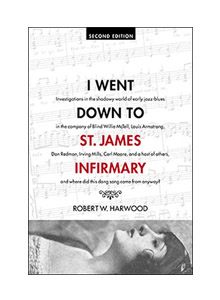

REVIEWS
2017
“The bookmaker [Harwood] makes me want to be at the El Torreon ballroom dancing the foxtrot with Irene Castle followed by a late date with Valadia Snow at the Noble Hotel where in the background I hear Don Redman’s ‘Chant of the Weed’ … Mr Harwood opened up so many musical alleys to explore. A sparkling book! One of the side-effects of this book is I now sport a Phil Baxter mustache.” — “Digger,” 2017
2016
“Bob Harwood is a rara avis. That this Irish-Canadian finds within him the inspired doggedness to try and unravel this massive ball of tangled yarn not just once, but now for the third time in a decade and a half (the first was Harwood’s A Rake’s Progress, in 2002; then this book’s first edition, six years later) is an enigma in itself. He does it in amazing detail, following each trail to a conclusion or… in some cases, to none. I won’t tread on Mark’s very fine review of the 1st Edition in 2008’s Winter issue, because the substance of the work is the same; but rather point out what the changes and differences are between editions. First, this one is longer, because it has new stuff about some of the actors in the drama. And there is an index, where previously there wasn’t. There is closer documentation of the origins of the different lyrical strains in the song, especially the “Let her go, let her go…” verse. The text of each chapter has been entirely rewritten, end-to-end, for clarity (did I say Harwood was dogged?) And in particular, the relationship of the song to The Unfortunate Rake, stated by some to be the indisputable root source of the ditty, is reevaluated and found to be no more solid in that category than anyone else’s theory of the song’s origin.
… The book is one of a kind. Bob Harwood states that this is the end of the story, as far as he has it in him to tell it. This work is unique, so if you don’t have it, get it.” — Malcolm Shaw, Vintage Jazz Mart Review, Summer 2016
Prior to 2016
[I Went Down to St James Infirmary] is a fascinating study and anyone who has an interest … in the way songs evolve and are passed along through history will find it an utterly compelling read. This critic confesses to a weakness for this type of book and devoured it with relish over a few days, though it will retain a favourtie place in his library and remain a reference for years to come.” — Barry Hammond, Penguin Eggs
“Before launching into one‘s learned explication of the history of St. James Infirmary, one might want to have a quick chat with Robert W. Harwood. He has written not one but two books on the subject. [H]e approached the subject with the care, caution and tenacity of an investigave reporter.” — Andrew Lawrence, Community Guitar Resources
“A fascinating and well-written book … Robert Harwood’s book is not the first devoted to one song, but it is the first to cross so many stylistic fences in its attempt to trace the origins of a tune, one which is lost in the mists of time.”
— Mark Berresford, review for VJM’s Blues and Jazz Mart
“A goldmine of information, with an amazing cast of characters. The definitive statement on the subject — and a very entertaining read to boot.” — Rob Walker, author of Buying In and Letters from New Orleans
“What better way to honour a great song than to tell a great story about it?” — David Fulmer, author of The Blue Door and Chasing the Devil’s Tail
“Robert Harwood’s exegesis on the blues classic ‘St. James Infirmary’ reassures readers that, in an era of instant messaging and blogs, there are still dedicated writers interested in expressing their disinterested preoccupation with cultural artifacts that have touched thousands of people in Europe and in the US over more than a century.” — Charles Cronin, is a musician and lawyer, currently at Yale University.
“No biography of (Irving) Mills has been written. The best short treatment of his life and work is in Harwood.”
— Terry Teachout in his book Duke: The Life of Duke Ellington
What readers are saying— SJI, SECOND EDITION, 2015/16
“I’m through St. James, and I have to congratulate you on a superb job. You cover just about every fact, story, anecdote and rumour possible.” Malcolm Shaw, editor of Brian Rust’s Jazz and Ragtime Records (1897–1942) [04/2016]
“I really really enjoyed revisiting the book in new-and-improved form. It’s a great job, both pleasurable and definitive. … every so while reading I had to just step back and marvel … ! It’s all an incredible lesson in how rich the right material can be.”
— Rob Walker [01/2016]
“How wonderful to see a new edition! The first edition has already turned me into a card-carrying SJI bore, and I can't wait to catch up with your latest findings. Many thanks for all your wonderful work; I absolutely love this book, and the blog.”
— Nick Lowe [10/2015]
What readers are saying— SJI, FIRST EDITION, 2008
“Nice job on the book. It was very attractively put together and professionally edited and I enjoyed it very much.” — Chris Kearin (Mount Kisco, NY) [08/2015]
“With one hand on the You Tube app with quick access to music mentioned in your book and the other on the pages of your book — what a great exerience. Thank you!
… Your dedicated research and exploration of many different trails is great fun to this reader. … It makes for great cultural history. The music is always part of a greater picture.
… I also want to congratulate you for the inspired writing and indirectly urging readers to explore, for instance I reached out for the CD Beautiful Dreamer with fine cover versions of Stephen Foster songs …
” — Niels Northroup [04/2015]
“Came home to it last night, and devoured it in a sitting - the book, at least. I was just about able to restrain myself from devouring the utterly unexpected and delightful enclosure, for which I cannot temperately thank you enough.
But the book: wow. I’d picked up bits of the story from the blog, but the book was an absolute feast. These are wonderful stories and you tell them so beautifully, with some truly spectacular coups like the Mills family history, and a fascinating narrative that turns out to be less about what historical truths we can recover than how the stories end up getting told.” — Nick Lowe (University of London, Department of Classics and Philosphy) [12/2014]
“I’m looking forward to receiving your book. I read a library copy last year, but I find that I would like to have a copy of my own on hand.” — Everett Howe (San Diego) [08/2013]
Further from Everertt Howe (who also created his own a cappella version of the song — which you can read about and link to on Robert’s blog). Included is a link to a multitude of versions of the song:
“St. James Infirmary has a long and storied history. Robert Harwood wrote an entire book about the piece, and keeps a blog about it as well, with links to new renditions and relevant historical material. Sarah Vowell wrote a nice essay about the song for Salon back in 1999 (although she mishears ‘standing pat’ as ‘standing fat’). There's lots to read about the song on the web, but there are many questionable statements about the provenance of the song as well; I'd advise reading Robert Harwood's book before you quote things you see online, to avoid propagating misinformation.
You can find a whole bunch of recordings of the song here.”
— Everett Howe [08/2013]
“I was fascinated while reading your book. The amount of research you did was impressive, (and perhaps bordering on obsessive in places.) The book brought back a flood of memories for me, because my father played clarinet, piano and saxophone. He was a fan of Benny Goodman, the Dorsey Brothers and Dixieland jazz, so many of the performers' names and song titles were familiar to me from conversations with him. As a teenager I hung out in coffee houses in Toronto, so I also heard a lot of the music you wrote about in those places.
I had no idea that St. James Infirmary had gone through so many hands and so many variations as you were able to trace in your book. I've heard quite a few different recorded versions, and it goes to show how many approaches there can be to a vital piece of music.
Thanks again for a great read. —
Bill Armstrong [08/2012]
“I'm about three quarters of the way through your amazingly well researched book and I'm convinced that this needs to be brought to the attention of the readers of blues magazines, there's much and more they'll find of interest.” — Alan B
“it is a wonderful book! I stumbled on your blog, got a copy through my library, and decided I had to own it — there is a lot there! Thank you for all your work in researching and writing it.” — Matt Meighan
“I finished reading your book last night. Thank you for the opportunity. It was intriguing on several levels. The biographies the musicians were absorbing, and the economic, social and technological history involved added a new dimension.…
It is a testimony to how this music has permeated North American culture that although I am the most amusical of persons I knew of almost every artist you discussed at least at the name recognition level and could remember hearing most of the songs.” — Ken Jensen
“I've really enjoyed it! Brilliant. The book has given me an enormous amount of pleasure.” — Richard Jenkins, Professor of Sociology, University of Sheffield, England
“Your book arrived and I am thrilled beyond belief at your great story! You found things about Carl that I didn’t even know!!” — Margie Moore
“Thank you for the copy of your just-released book … Altogether it is an excellent piece of work and I congratulate you on the final result.” — J.E. Bennett
"I’ve been reading [I Went Down to St James Infirmary] and think it’s fabulous. I have friends who would greatly benefit from its erudition." — Ronald Grimes, Chair of Ritual Studies: Radboud University Nijmegen, the Netherlands.
“I Went Down to St James Infirmary is a fun read and informative about more than just the song and those who sang it.” — P. Austin
“I enjoyed the book very much, and have already put factoids/
stories to use in conversation at the pub!” — Beate Schwertlich
“Because of your website, I was able to get the Unfortunate Rake, and learn much of the story. So my deepest thanks for your hard work, because this is my favorite New Orleans song and I love how it fits into the whole story of the Unfortunate Rake. I finally have had some money, so I was happy to get a copy of the book and finally get even more in-depth to the story.” — Jason Olds, New Orleans
 |
For more information please go to the PRESSROOM
Updated MAY 2016